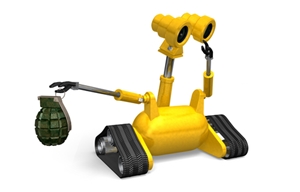As use of robots on the battlefield increases, a strange connection is being forged between these machines and the active-duty troops they serve. Slate recently reported that servicemembers are becoming attached to the mechanical beings – and it might have detrimental effects.
Military bots
Nearly all military organizations utilize robots on the frontline to meet various needs, including inspecting, detecting and defusing explosives. As a result, the robots work closely with Explosive Ordnance Disposal squads. According to Army of Robots, the Daksh robot is one of the most used machines among military organizations. Controlled through a remote, the small robot locates and handles active explosives, ultimately defusing them. It also features an X-ray scanning device that has come in handy for identifying strange material.
The MARCbot was also heavily featured during the Iraq war. Small and low-cost, the robot, which resembles a toy truck, is primarily used to inspect suspicious or risky objects.
An emotional attachment
Because the servicemembers spend so much time with the robots, they have come to know them in an almost-intimate way, said Julie Carpenter, a writer and researcher from the University of Washington. Carpenter interviewed 23 soldiers who regularly worked with the machines for a recent book on human and robot relations, Slate reports.
According to the news source, Carpenter found that the servicemembers began identifying with their mechanical colleagues, giving them names – that they sometimes painted onto the robots – and personalities. In an interview with the University of Washington, Carpenter added that the servicemembers felt powerful emotions when their fellow mechanical mates were destroyed. Many soldiers even held funerals for their robots.
"Some operators reported they saw their robots as an extension of themselves," Carpenter told the university, adding that the soldiers would become frustrated or angry when a robot was experiencing technical issues.
Dangers of friendship
After uncovering the soldiers' intense feelings toward the robots, Carpenter started worrying about the effects it would have on their combat performance. Although the soldiers insisted to Carpenter that they were able to fully function despite their emotional attachment, the researcher believes there might be dangers on the battlefield.
"They were very clear it was a tool, but at the same time, patterns in their responses indicated they sometimes interacted with the robots in ways similar to a human or pet," Carpenter said.
To ensure that the use of military robots doesn't compromise the performance of active-duty troops, Carpenter suggests the U.S. military takes a closer look at human-robot relations when further developing robot technology, especially since new designs have added human and animal-like features to the tiny machinery.

